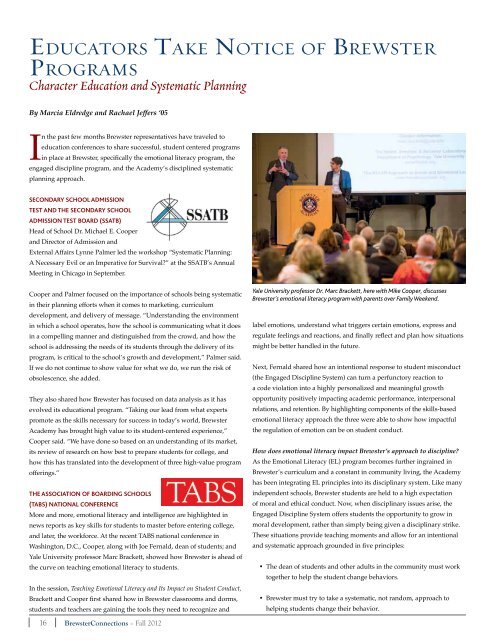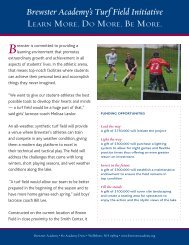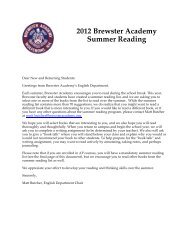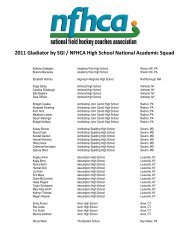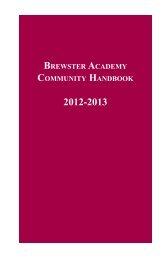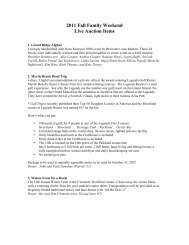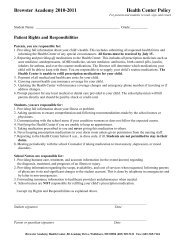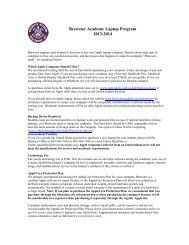Brewsterconnections - Brewster Academy
Brewsterconnections - Brewster Academy
Brewsterconnections - Brewster Academy
You also want an ePaper? Increase the reach of your titles
YUMPU automatically turns print PDFs into web optimized ePapers that Google loves.
Educators Take Notice of <strong>Brewster</strong>ProgramsCharacter Education and Systematic PlanningBy Marcia Eldredge and Rachael Jeffers ‘05In the past few months <strong>Brewster</strong> representatives have traveled toeducation conferences to share successful, student centered programsin place at <strong>Brewster</strong>, specifically the emotional literacy program, theengaged discipline program, and the <strong>Academy</strong>’s disciplined systematicplanning approach.Secondary School AdmissionTest and the Secondary SchoolAdmission Test Board (SSATB)Head of School Dr. Michael E. Cooperand Director of Admission andExternal Affairs Lynne Palmer led the workshop “Systematic Planning:A Necessary Evil or an Imperative for Survival?” at the SSATB’s AnnualMeeting in Chicago in September.Cooper and Palmer focused on the importance of schools being systematicin their planning efforts when it comes to marketing, curriculumdevelopment, and delivery of message. “Understanding the environmentin which a school operates, how the school is communicating what it doesin a compelling manner and distinguished from the crowd, and how theschool is addressing the needs of its students through the delivery of itsprogram, is critical to the school’s growth and development,” Palmer said.If we do not continue to show value for what we do, we run the risk ofobsolescence, she added.They also shared how <strong>Brewster</strong> has focused on data analysis as it hasevolved its educational program. “Taking our lead from what expertspromote as the skills necessary for success in today’s world, <strong>Brewster</strong><strong>Academy</strong> has brought high value to its student-centered experience,”Cooper said. “We have done so based on an understanding of its market,its review of research on how best to prepare students for college, andhow this has translated into the development of three high-value programofferings.”The Association of Boarding Schools(TABS) National ConferenceMore and more, emotional literacy and intelligence are highlighted innews reports as key skills for students to master before entering college,and later, the workforce. At the recent TABS national conference inWashington, D.C., Cooper, along with Joe Fernald, dean of students; andYale University professor Marc Brackett, showed how <strong>Brewster</strong> is ahead ofthe curve on teaching emotional literacy to students.In the session, Teaching Emotional Literacy and Its Impact on Student Conduct,Brackett and Cooper first shared how in <strong>Brewster</strong> classrooms and dorms,students and teachers are gaining the tools they need to recognize andYale University professor Dr. Marc Brackett, here with Mike Cooper, discusses<strong>Brewster</strong>’s emotional literacy program with parents over Family Weekend.label emotions, understand what triggers certain emotions, express andregulate feelings and reactions, and finally reflect and plan how situationsmight be better handled in the future.Next, Fernald shared how an intentional response to student misconduct(the Engaged Discipline System) can turn a perfunctory reaction toa code violation into a highly personalized and meaningful growthopportunity positively impacting academic performance, interpersonalrelations, and retention. By highlighting components of the skills-basedemotional literacy approach the three were able to show how impactfulthe regulation of emotion can be on student conduct.How does emotional literacy impact <strong>Brewster</strong>’s approach to discipline?As the Emotional Literacy (EL) program becomes further ingrained in<strong>Brewster</strong>’s curriculum and a constant in community living, the <strong>Academy</strong>has been integrating EL principles into its disciplinary system. Like manyindependent schools, <strong>Brewster</strong> students are held to a high expectationof moral and ethical conduct. Now, when disciplinary issues arise, theEngaged Discipline System offers students the opportunity to grow inmoral development, rather than simply being given a disciplinary strike.These situations provide teaching moments and allow for an intentionaland systematic approach grounded in five principles:• The dean of students and other adults in the community must worktogether to help the student change behaviors.• <strong>Brewster</strong> must try to take a systematic, not random, approach tohelping students change their behavior.16 <strong>Brewster</strong>Connections – Fall 2012


